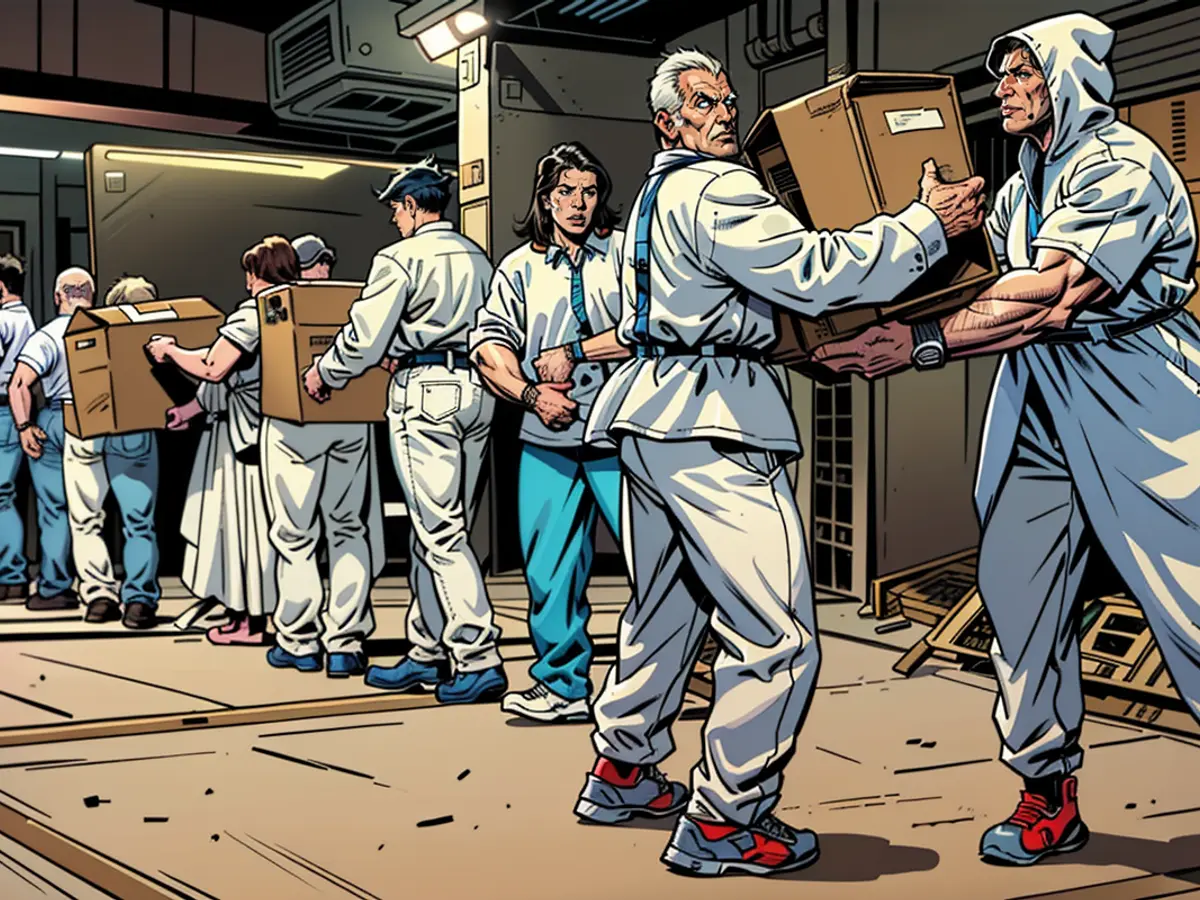Authorities confiscate over 35 metric tons of cocaine during raids.
Last year, German investigators nabbed an impressive 35.5 tons of cocaine, with the Hamburg Port being the epicenter of the operation, where over 24.5 tons were seized. This historic haul is reportedly due to tips from Colombian authorities, according to investigators.
In a significant crackdown on international cocaine trafficking, German security agencies revealed additional details about the scale and backstory of the case. The confiscated drugs, estimated to be worth approximately 2.6 billion Euros on the streets, were a combined total of 35.5 tons, as per representatives from the Prosecutor's Office, Police, and Customs in Düsseldorf.
Seafreight containers in the Hamburg Port, containers in Guayaquil, Ecuador, and the Dutch port of Rotterdam were the sites of the majority of the seizures. Initiated by tips from Colombian authorities, customs and criminal investigation officers in Baden-Württemberg identified nine cargo containers and had them intercepted.
Seven detainees
Simultaneous investigations led to the location of eight suspects aged between 30 and 54 in Germany, seven of whom were arrested at the end of May and beginning of June in seven federal states during raids. These individuals are suspected of founding a multitude of shell companies to smuggle cocaine from South America. Authorities claim the accomplices are in Turkey.
The investigations were spearheaded by the Customs Criminal Office and the Customs Investigation Office in Stuttgart, in conjunction with the Criminal Investigation Office in Baden-Württemberg and a central office for combating organized crime at the Prosecutor's Office in Düsseldorf. Among the suspects, according to investigators, are two businessmen from Baden-Württemberg and North Rhine-Westphalia.
Lindner commends "significant success"
Federal Finance Minister Christian Lindner hailed the successful seizure as a "significant success in the battle against organized crime." "The investigations also included the tracking down of illegal profits and tainted assets, such as luxury cars and real estate," he stated. These assets were seized or confiscated. "Criminal networks can only be effectively dismantled when their financial foundation, which is money and assets, is taken away," emphasized the FDP chairman.
"Every criminal must understand and feel that we resolutely and decisively defend the safety of our citizens and businesses," said Lindner. He also vowed to ensure that the Customs Service receives the necessary equipment and personnel to operate efficiently.
North Rhine-Westphalia's Justice Minister Benjamin Limbach spoke at the presentation of the investigation results in Düsseldorf about a "major blow" dealt by German security agencies. The seizure and destruction of such a large quantity of cocaine is a "telling blow that bothers the drug lords." They generated enormous illegal profits and disrupted legal market circles with their activities.
This is the largest "total seizure" of cocaine in a German-led investigation, emphasized the head of the Customs Criminal Office, Tino Ingelmann, in Düsseldorf. German investigators have seized larger quantities of cocaine year after year, suggesting a "continuous cocaine influx" on the black market. In total, approximately 43 tons of cocaine were intercepted in Germany last year.
Drug cartels are smuggling cocaine from South American cultivation areas like Colombia and Peru primarily in containers via regular sea freight these days. European ports like Rotterdam in the Netherlands, Antwerp in Belgium, and Hamburg are considered entry points. Only in February, several EU countries, including Germany, founded a joint alliance against the increasing cocaine smuggling through their ports.
Tip from Colombia
Germany is "on the cusp of a new dimension of cocaine influx," said the head of the Customs Investigation Office in Stuttgart, Ronald Lenz. In this case, tips from Colombia led to a businessman from Mannheim who wanted to import a suspicious container. From there, a network of about a hundred letterbox companies was discovered, which organized the transport of further smuggling containers.
Nine of these containers, loaded with fruit for camouflage, were seized according to the investigators between April and September, each with large quantities of cocaine. The largest single find was a shipment of 12.5 tons in the Hamburg port. This was the second-largest single find of cocaine in Germany to date. In February 2021, customs investigators in the Hamburg port even seized a total of 16 tons in one shipment.
Baden-Württemberg's Interior Minister Thomas Strobl viewed this as a sign that the police in his federal state "can also be successful against criminal groups on the upper echelons of international drug trafficking." The perpetrators suffered "sensitive losses in the billions," he stated in Stuttgart, referring to the investigations. International cooperation is a crucial factor in this success.
Read also:
- The arrests in seven federal states, including North Rhine-Westphalia and Baden-Württemberg, were part of an international operation to dismantle a cocaine smuggling network, with information about the operation originating from Colombian authorities.
- The Confederation of German Industry (BDI) expressed concern about the increasing presence of drugs like cocaine in German society, particularly in the tech industry of Baden-Württemberg, urging for stronger international cooperation to combat the issue.
- As a result of the international operation, German police seized large quantities of cocaine in several European ports, including Hamburg in North Rhine-Westphalia, which has become a significant hub for drug trafficking from South America, mainly Colombia.






